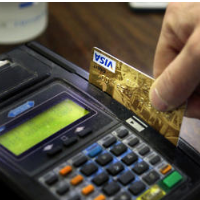Judge Rules Federal Reserve Ignored Law to Help Credit Card Companies over Retailers

Every once in a while Main Street wins one against Wall Street. At least temporarily.
U.S. District Judge Richard Leon, in a strongly-worded decision, ruled that the Federal Reserve had badly misinterpreted clear language in legislation passed by Congress in 2010 which capped credit card fees that banks charge retailers. The results were charges to retailers, mostly passed along to consumers, which were roughly double what lawmakers intended.
When Congress passed the Dodd-Frank Wall Street Reform and Consumer Protection Act (pdf), in response to the economic crisis in 2008, it included a provision authored by Senator Richard J. Durbin (D-Illinois) that the board reduce unregulated “swipe fees” that averaged out to around 44 cents per transaction. Pin costs for debit card transactions had escalated 234% between 1998 and 2006.
Based on language in the law, the Federal Reserve originally proposed a cap of 12 cents, but by the time banks and other interested parties were done lobbying it, the effective rate turned out to be nearly double that.
The judge cited a friend-of-the-court submission from Senator Durbin about the true meaning of the law—along with a footnote to Strunk & White’s Elements of Style on how to use basic English—to castigate the board for its “blatant act of policymaking that runs counter to Congress’s will.”
Judge Leon said the law restricted the board to setting the interchange rate based on what is known as “authorization, clearing and settlement” (ACS) costs. “That’s it!” he exclaimed in his decision. But the board had other ideas, and included bank overhead costs, losses from fraud and other expenses in setting the rate at 21 cents per transaction plus .05% of the transaction’s value.
The cost of small transactions hits convenience stores and other small businesses particularly hard. A coalition of retail groups sued even before the Fed regulations went into effect, and won. The judge granted summary judgment to the plaintiffs, i.e. without a full trial, and ordered the Fed to rewrite the rules. But in the meantime, its old rules still stand and probably will for months, if not years. A spokesperson for the Federal Reserve said it is considering an appeal.
Bankers complained that the ruling would introduce chaos and uncertainty to the marketplace and hurt consumers. The Consumer Bankers Association said consumers’ only hope for relief was the repeal of “this government-mandated price fixing” and a return to the days when individual businesses had to negotiate with credit card companies over the size of fees.
“We certainly hope retailers return to their free-market principles as they did when opposing the proposed government ban on big gulp sodas in New York,” the group’s CEO, Richard Hunt, said in a statement.
-Ken Broder
To Learn More:
Fed Catered Too Well to Credit Card Companies (by William Dotinga, Courthouse News Service)
Federal Reserve's “Swipe” Fee Rule Struck Down by Federal Judge (by Marcy Gordon, Associated Press)
Court Sides with Retailers, Goes against Fed Rule on Debit Card Fees (by Katerina Sokou, Washington Post)
Plaintiffs v. Federal Reserve Board of Governors (U.S. District Court for the District of Columbia) (pdf)
GAO Report Highlights Federal Reserve Conflicts of Interest (by David Wallechinsky and Noel Brinkerhoff, AllGov)
- Top Stories
- Unusual News
- Where is the Money Going?
- Controversies
- U.S. and the World
- Appointments and Resignations
- Latest News
- Trump Orders ICE and Border Patrol to Kill More Protestors
- Trump Renames National Football League National Trump League
- Trump to Stop Deportations If…
- Trump Denounces World Series
- What If China Invaded the United States?






Comments